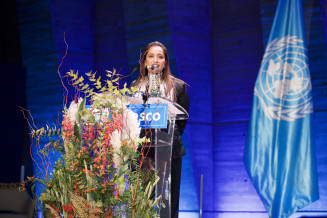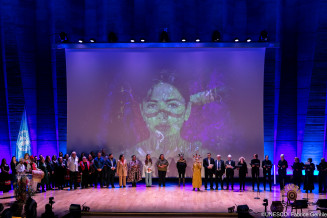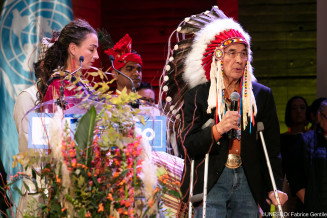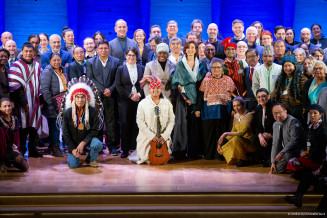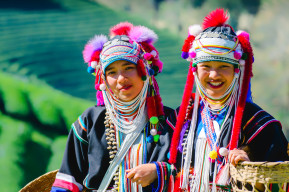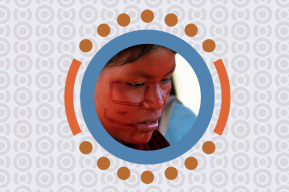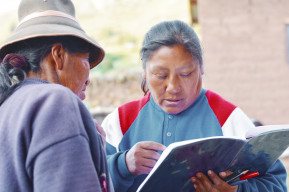Article
Thousands connected to celebrate the Indigenous Languages Decade

A study published in 2021 sounded alarm: out of the more than 6,000 of indigenous languages, almost half are in danger, and 1500 are in an imminent danger. The Decade is a call for action to make every effort to preserve these languages and promote the need to protect them. Indigenous people from all over the world shared their hopes and commitment, whereas countries agreed on a common roadmap to strengthen public policies for Indigenous Peoples.
Kaya kwoba Djanga (Hello good spirit)!
The celebration started with the sacred words from a 40,000-year-old song performed by a Wardandi Elder, Mitchella Hutchins, from Australia and was followed by statements by stakeholders and powerful songs from Indigenous peoples from around the world.
During the discussions, many people emphasized the importance of supporting small cultural organizations and local activists, claiming that such support has been long overdue. Mr Binota Damai, Chair-Rapporteur of the United Nations Expert Mechanism on the Rights of Indigenous Peoples, expressed “They need recognition, capacity building, and funding, especially from state governments who now have an opportunity to meet their human rights obligations by supporting these entities at the front lines of language revitalization”. Mr. Freddy Condo Riveros, of the UN Permanent Forum on Indigenous Issues, recalled the duty of governments to support the noble task of working towards the objectives of the International Decade of Indigenous Languages as an historical debt towards Indigenous peoples and called the International Decade a great opportunity to redress the wrong that has been done to Indigenous Peoples during centuries.
The afternoon sessions focused on Indigenous languages for education, culture, climate change, social and digital inclusion reflecting the UNESCO mandates.
In referring to UNESCO’s effort to preserve natural and cultural heritage sites, the specialists explained that Indigenous and local knowledge and language are powerful resources in protecting and sustaining nature and ecosystems. Indigenous culture is intrinsically linked to nature and indigenous people have much to share with the rest of the world about environmental sustainability. In a session regarding digital inclusion, the private sector showcased how they are bringing Indigenous languages to their technological devices and services. Motorola has now included Nheengatu, Kaingang and Cherokee, so that Indigenous communities can use smartphones in their native languages.
To reflect the discussions and experiences shared during the sessions, UNESCO will step up its efforts to incorporate indigenous knowledge systems into various programmes.
In closing of the event, UNESCO’s Director General, Audrey Azoulay, stated that “this Decade marks a victory in the long struggle of indigenous peoples for recognition of their rights, their cultures and, in particular, their languages, which embody diversity and human wealth”.
Indigenous songs were performed by artists from Livonia, Paraguay, Brazil, India, and Canada to mark the closing of the celebration.
The success of the Decade will be determined by the number and impact of the localised efforts of the Decade's Global Action Plan. How many Indigenous languages will be revived globally? How many Indigenous Languages will be included in public services such as health care, education, and justice? How many Indigenous people will be involved in decision-making processes or mainstream cultural systems? The Decade has been launched. UNESCO is calling everyone to advocate for the preservation of Indigenous languages around the globe.


